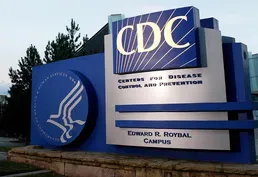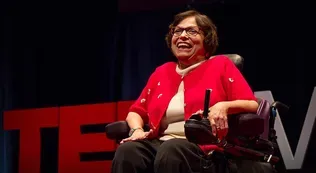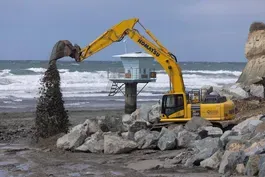
GOP divisions become clearer as White House race takes shape
Clip: 3/6/2023 | 11m 6sVideo has Closed Captions
GOP divisions become clearer as field of candidates for White House begins to take shape
Presidential primary voters will cast their first ballots in less than a year. As the field begins to take shape and pressure mounts, divisions within the GOP are becoming clearer. Doug Heye, former communications director to House Majority Leader Eric Cantor and the RNC, and David Avella, chair of GOPAC, a Republican Super PAC that trains and assists candidates, join Amna Nawaz to discuss.
Problems with Closed Captions? Closed Captioning Feedback
Problems with Closed Captions? Closed Captioning Feedback
Major corporate funding for the PBS News Hour is provided by BDO, BNSF, Consumer Cellular, American Cruise Lines, and Raymond James. Funding for the PBS NewsHour Weekend is provided by...

GOP divisions become clearer as White House race takes shape
Clip: 3/6/2023 | 11m 6sVideo has Closed Captions
Presidential primary voters will cast their first ballots in less than a year. As the field begins to take shape and pressure mounts, divisions within the GOP are becoming clearer. Doug Heye, former communications director to House Majority Leader Eric Cantor and the RNC, and David Avella, chair of GOPAC, a Republican Super PAC that trains and assists candidates, join Amna Nawaz to discuss.
Problems with Closed Captions? Closed Captioning Feedback
How to Watch PBS News Hour
PBS News Hour is available to stream on pbs.org and the free PBS App, available on iPhone, Apple TV, Android TV, Android smartphones, Amazon Fire TV, Amazon Fire Tablet, Roku, Samsung Smart TV, and Vizio.
Providing Support for PBS.org
Learn Moreabout PBS online sponsorshipAMNA NAWAZ: Which person and what message would offer the Republican Party the best chance to win back the White House next year?
Those are two questions generating a lot of discussion among potential candidates and grassroots activists.
Lisa Desjardins has this roundup of the weekend debate.
LISA DESJARDINS: The Republican field is taking shape.
FMR.
GOV.
LARRY HOGAN (R-MD): It was a tough decision, but I have decided that I will not be a candidate for the Republican nomination for president.
LISA DESJARDINS: As former Maryland Governor Larry Hogan, a moderate, says he will sit out the 2024 race for the White House.
His concern, splitting the opposition to former President Donald Trump.
FMR.
GOV.
LARRY HOGAN: I didn't want to have a pileup of a bunch of people fighting.
GOV.
CHRIS SUNUNU (R-NH): Thank you for your service.
We're moving on.
LISA DESJARDINS: One potential candidate still deciding, New Hampshire Governor Chris Sununu, also wants to move past Trump, but will back him if he wins the nomination.
GOV.
CHRIS SUNUNU: Yes, look, I'm a lifelong Republican.
I'm going to support the Republican nominee.
LISA DESJARDINS: This, as Trump... ANNOUNCER: President Donald J. Trump!
LISA DESJARDINS: ... heard cheers Saturday on political home turf.
His speech at CPAC, the Conservative Political Action Conference, was a mix of philosophy and fabrication, but something new.
The former president who once railed against mail-in and some early voting is changing strategy.
DONALD TRUMP, Former President of the United States: Republicans must compete using every lawful means to win.
That means swamping the left with mail-in votes, early votes and Election Day votes.
LISA DESJARDINS: Trump, in the midst of multiple investigations, told reporters he will stay in the race even if indicted.
On stage, he seemed to lash out at key rival Ron DeSantis, who once wanted to privatize Social Security.
DONALD TRUMP: We are not going back to people who want to destroy our great Social Security system, even some in our own party.
I wonder who that might be.
LISA DESJARDINS: The Florida governor, who now says he won't disrupt Social Security, wasn't at CPAC.
He told others last week that Republicans have sat back like potted plants and need to push on cultural issues.
That is the theme for other Republicans too, including at CPAC, where some remarks about anti-LGBTQ and anti-transgender legislation ignited immediate concern.
MICHAEL KNOWLES, Conservative Commentator: The political stakes for our country are very, very high.
LISA DESJARDINS: Conservative author and commentator Michael Knowles drew criticism for these words: MICHAEL KNOWLES: Transgenderism must be eradicated from public life entirely.
LISA DESJARDINS: Which some said amounted to a call for genocide.
Knowles, who has made similar remarks before, both doubled down and pushed back on his online show.
MICHAEL KNOWLES: Nobody is calling to exterminate anybody, because the other problem with that statement is that transgender people is not a real ontological category.
It's not a legitimate category of being.
LISA DESJARDINS: Transgender is a recognized category in science, medicine and, per one recent study, the identity of some 1.6 million Americans.
As Republicans pushed further right, a Democrat from the left jumped in.
MARIANNE WILLIAMSON (D), Presidential Candidate: I'm a candidate for the office of president of the United States.
(CHEERING AND APPLAUSE) LISA DESJARDINS: Author Marianne Williamson, whose 2020 attempt failed, announced her longshot campaign, making her the first Democrat to challenge President Biden.
For the "PBS NewsHour," I'm Lisa Desjardins.
AMNA NAWAZ: Presidential primary voters will cast their first ballots in less than a year.
As the field begins to take shape and pressure mounts, divisions within the GOP are becoming clearer.
For an insiders' view on what's happening, we have Doug Heye, the former communications director to House Majority Leader Eric Cantor and to the Republican National Committee, and David Avella, chairman of GOPAC, a Republican super PAC which trains and assists candidates up and down the ballot.
Welcome to you both.
Thanks for being here.
DAVID AVELLA, Chairman, GOPAC: Thank you.
DOUG HEYE, Republican Strategist: Thank you.
AMNA NAWAZ: David, let's start with Governor Hogan's decision not to run, specifically, specifically to discourage a crowded field that he believes could benefit former President Trump.
If you are another candidate, a potential candidate who is polling in single digits like he was, do you have to now weigh the same concerns?
DAVID AVELLA: Absolutely.
You look at Ron DeSantis, who is sitting there with well over $90 million sitting in his bank account, he's clearly right now a contender to be the nominee, and you're looking at that and you're saying, wow, where do I get the oxygen, it's actually what Governor Hogan said.
He goes, so much of the oxygen right now is being taken up by former President Trump and by Governor DeSantis, that there really isn't a lane for me.
And that's why he passed.
AMNA NAWAZ: Doug, you see it the same way?
DOUG HEYE: I do.
And part of that is also how the committee, the RNC, is structuring, or has structured in 2015 and '16 these primaries.
If you start with winner-take-all, well, that means if David's running against me, and he gets one more vote, he gets all the delegates.
If you're running and you're at 2 percent or 4 percent in the polls or in the -- ultimately, in a primary, and it's winner-take-all, if you're -- if your concern is Donald Trump, your 2 percent, your 6 percent may be actually helping Donald Trump to get all of those delegates in a particular state.
AMNA NAWAZ: I'm curious.
When you look at the field of the potentials and even Governor Hogan, who's now said he is not running, the popularity of Republican governors in blue states or purple states does not seem to be translating nationally right now, right?
You have Charlie Baker, who left Massachusetts, went to run the NCAA, Governor Hogan saying he's not running.
Why do you think that is?
DOUG HEYE: Governors are known in their states.
They, by and large, unless they are in large states or are catching fire for some other reason, aren't really known that well outside of their states.
They have to then really work hard in that process.
A good example was a guy named Bill Clinton.
Nobody really knew nationally who Bill Clinton was because he was -- and the criticism on him was, he was a failed governor, Republicans said -- we will leave that open to debate -- but of a small state.
And that was certainly true then.
And it was very hard for him to really get known.
Eventually, obviously, it worked for him.
But that's what these governors have to overcome in these early parts of the primary process.
DAVID AVELLA: What we're also seeing, though, is, is that not only are Republican governors popular in Democratic-led states.
They're also popular in Republican-led states.
And that's why you see the migration from Democratic -- traditionally Democratic states, California, Illinois, New York, the migration over the last few years have been to Southern states, whether that be Florida, or Tennessee, or North Carolina, all those leading into where Americans are ultimately moving to.
So, it's Republican governors in Democratic and Republican states that are getting high approval marks.
AMNA NAWAZ: I'm curious.
When you look at some of the folks we just heard from, potential candidates and candidates -- Nikki Haley, in particular, you see where they go to address potential voters, right?
It seems like you either go to CPAC to address sort of the populist crowd, or you go to Club for Growth and talk to the establishment voters.
Is this where the rift is right now in the Republican Party?
DAVID AVELLA: If you want to get to Republican voters, you go to social media, which is where anybody who wants to amplify their message... AMNA NAWAZ: But candidates has made a choice to either go to CPAC or Club for Growth, right?
Only Nikki Haley went to both.
DAVID AVELLA: Well, Governor DeSantis went to California and went to the Reagan Ranch, so -- or the Reagan Library, I should say.
So, there are many places.
And this -- look, we have a long time to go.
Let's keep in mind the last few winners of the CPAC straw poll was Ted Cruz, Ron Paul, Ron Paul, and Ron Paul.
It's not been a particularly good indicator of who our nominee is going to be.
Now, maybe President Trump will ultimately be the nominee.
We have a long way to go before we know that.
DOUG HEYE: And, to David's point, I was wearing my 2012 Iowa straw poll T-shirt.
A lot of people forget who won in 2012.
It was Michele Bachmann.
Her campaign didn't do well.
We should disregard straw polls.
They're fun to talk about, but they are not even cotton candy level of nutritional value for politics.
AMNA NAWAZ: You mentioned governors having trouble going outside their states.
Now, Doug, you made this point.
Is Ron DeSantis going to have that same problem?
DAVID AVELLA: It doesn't look like it.
I mean, he's well into the mid 20s to 30s, depending on which poll you see.
He clearly is getting lift.
And his donor base isn't just from Florida.
I mean, he's raising money across the country.
But he has gotten the ability to get some oxygen and get some attention.
And that's why you see him where he is in the polls right now.
AMNA NAWAZ: We have seen as well, though, his -- he's running on sort of this anti-woke agenda, right?
When you look at Governor Hogan, who said "I am not going to run in this field," now, he is firmly a Reagan Republican, right, even wrote in Ronald Reagan for president in 2020, instead of voting for then-candidate Trump.
Is that school of thought, is that unelectable in the Republican Party right now, that Reagan Republican?
DOUG HEYE: I don't think we know yet.
And we're coming up on the 40th anniversary of Ronald Reagan's evil Empire speech.
And, certainly, we will be talking about that over the next week and what that meant in regards to what it means now with Russia and Ukraine.
And if you look at the audience at CPAC, for instance, not very firmly behind Ukraine right now, where they were a year ago.
So, where Republicans are going to be on this issue really depends quite often on where their voters are going to be, but, also, are they going to be able to lead in those areas and what's their traction going to be?
It really still remains to be seen.
I'm nervous about it, especially on the Ukraine issue.
But we have to wait and see.
AMNA NAWAZ: It strikes me, David, the two candidates who are leading our polls by a mile, former President Trump and Governor Ron DeSantis, aren't really talking about the economy or taxes or foreign policy even.
They're talking about the social and cultural, divisive kind of issues.
Is that what we're going to continue to see.
DAVID AVELLA: I would push back there a little bit.
Governor DeSantis does talk about the economic success that they are having in Florida.
He does talk about the tax cuts that they have pushed the last few years through the legislature.
Ultimately, he's talking to social and economic conservatives, which, if you're going to put a winning coalition together, you have to be able to talk to Republicans who are concerned about the economy and about their security.
AMNA NAWAZ: Doug, you see it the same way?
DOUG HEYE: I do.
And what's interesting about Ron DeSantis is, he hasn't taken any of the bait from Donald Trump.
And to use David's word oxygen, that means he's denying Donald Trump some of the oxygen that Donald Trump needs, which is, he's spoiling for a fight.
He clearly wants to get in a fight with DeSantis as he comes up with nicknames.
Ron DeSantis doesn't do things accidentally.
He's choosing not to respond.
And that may not be sustainable for a year.
But, right now, it's the smart and strategic thing to do.
DAVID AVELLA: And it's a playbook that Governor Brian Kemp used in Georgia, as President -- former President Trump came after him in the primary.
He didn't engage.
And he ultimately went on to win not only the primary last year, but also a huge win against Stacey Abrams, who was the Democratic star.
AMNA NAWAZ: And a huge caveat, we have to say, it is March of 2023.
DAVID AVELLA: Absolutely.
(LAUGHTER) AMNA NAWAZ: We will be having this conversation a lot more over the months ahead.
Gentlemen, thank you so much, David Avella and Doug Heye.
DOUG HEYE: Thank you.
DAVID AVELLA: Thank you.
AMNA NAWAZ: And, tomorrow, we will continue our conversation about the future of the Republican Party when we sit down with former Maryland Governor Larry Hogan and New Hampshire Governor Chris Sununu.
CDC director on how the agency's addressing COVID shortfalls
Video has Closed Captions
Clip: 3/6/2023 | 7m 46s | CDC Director Dr. Rochelle Walensky discusses how the agency is addressing COVID shortfalls (7m 46s)
COVID disruptions at work lead to baby boom
Video has Closed Captions
Clip: 3/6/2023 | 8m 31s | COVID disruptions at work lead to baby boom (8m 31s)
Iran's future on the world stage increasingly uncertain
Video has Closed Captions
Clip: 3/6/2023 | 8m 49s | Iran's future on the world stage uncertain amid continuing protests, nuclear enrichment (8m 49s)
Judy Heumann's lasting contributions to disability rights
Video has Closed Captions
Clip: 3/6/2023 | 3m 50s | Remembering Judy Heumann's lasting contributions to disability rights (3m 50s)
News Wrap: California residents reeling as storm approaches
Video has Closed Captions
Clip: 3/6/2023 | 5m 18s | News Wrap: California residents reeling as another winter storm approaches (5m 18s)
Providing Support for PBS.org
Learn Moreabout PBS online sponsorshipSupport for PBS provided by:
Major corporate funding for the PBS News Hour is provided by BDO, BNSF, Consumer Cellular, American Cruise Lines, and Raymond James. Funding for the PBS NewsHour Weekend is provided by...















